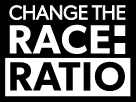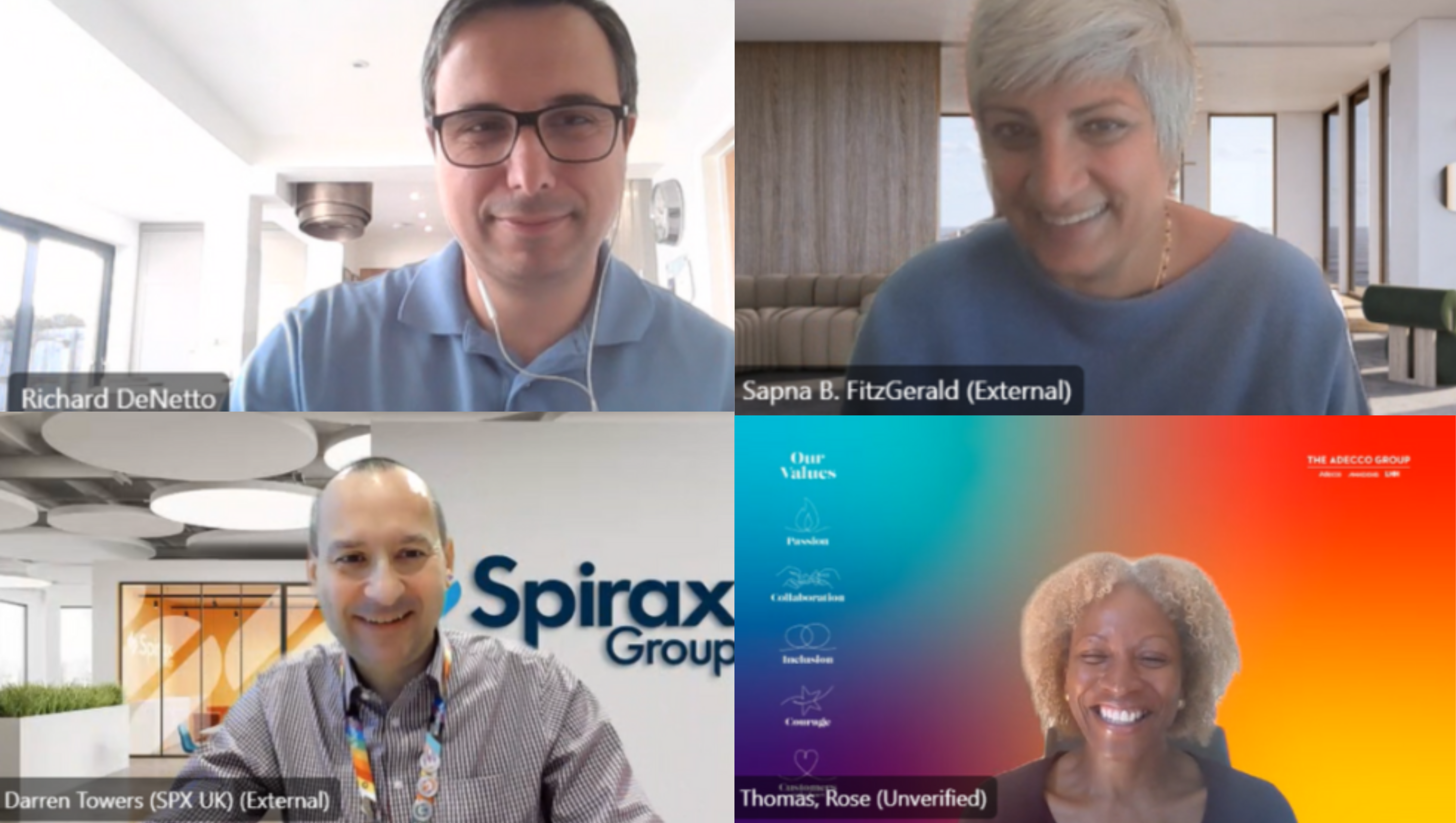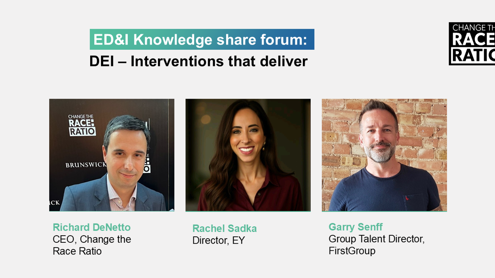The future of ERGs: Moving from symbolism to strategic change
Employee Resource Groups (ERGs) are often described as the heartbeat of inclusion, but how do we ensure they are more than providing a voice but real influential change? At our recent Culture and Inclusion Knowledge Share Forum, members shared insights on the role ERGs can and should play in driving structural change, leadership accountability and long-term impact. Businesses came together to examine a vital question: how can ERGs evolve from voluntary networks into strategic drivers of inclusion?
Chaired by Richard DeNetto, CEO of Change the Race Ratio, the session brought together perspectives from across the spectrum of roles that shape ERGs in practice:
- Rose Thomas, Project Manager and Ethnicity ERG Co-lead at Adecco
- Darren Towers, Group Head of Inclusion, Equity and Wellbeing at Spirax Group
- Sapna Fitzgerald, Group General Counsel and ExCo sponsor at Grainger PLC
ERGs must shift from voluntary passion to business impact
One of the strongest themes to emerge was the need for ERGs to be understood not as side projects, but as mechanisms for long-term cultural and strategic change. Darren Towers argues that the case for ERGs rest on four pillars.
- They connect colleagues with shared identity and experience
- They offer learning opportunities for allies
- They are open to everyone to help shape a better workplace
- They provide the business with a vital sounding board for testing ideas, policies and responses
He spoke of how important the networks have been invaluable during times of crises such as during the COVID-19 lockdown and during moments of political unrest. Darren emphasised that the need to evolve beyond voluntary enthusiasm and suggested ERGs be embedded into governance and visibly supported by ExCo sponsors. He pinpointed how this can be done – by recognising ERG involvement as professional development, resourcing activities and linking objectives to performance.
Darren also highlighted that for organisations looking to establish networks, the key is to start simple. The business should listen to colleagues with lived experiences, identify a clear purpose and be wary of overengineering structures too early, instead “going where the energy flows”. He also noted that ERGs are more effective when they work collaboratively, sharing resources, aligning priorities and supporting one another’s initiatives as to avoid duplication and amplify impact. This provides the ERGs with a stronger, more influential voice across the organisation.
Rose Thomas spoke candidly about the reality of balancing her project management role with her ERG leadership responsibilities. Much of her work, from creating toolkits to running safe spaces, happens outside contracted hours. Yet, she emphasised that the long-term benefits for colleagues and the business make this commitment worthwhile.
“ERGs aren’t just about today’s passion, they’re about tomorrow’s change.” – Rose Thomas, Adecco
Crucially, Adecco has taken steps to recognise this contribution. ERG leadership is now reflected in development plans as part of formal objectives and has even been recognised through global company awards. Rose described how ERG insights directly informed new initiatives, such as an Ethnic Representation and Management Programme, designed in response to employee feedback.
Executive sponsorship requires more than symbolic presence
The forum also explored the role of executive sponsors in elevating the work of ERGs and Sapna Fitzgerald set out the responsibility of ExCo members. She argued leaders cannot remain silent; they must use their position to ask difficult questions and shape responses. In her view, effective sponsorship is not about turning up to ERG events as a figurehead, but about visible and authentic engagement. She shared examples from both her current role at Grainger and her previous experience, where ERGs influenced policy shifts such as improved maternity provision and signing up to Change the Race Ratio.
“Whether you’re formally an ExCo sponsor or informally because you’re in that room, [you] have a responsibility to speak up and ask the question as to what we are going to do as an organisation” – Sapna Fitzgerald, Grainger PLC, on reacting to the BLM movement and political unrest in the UK.
Authenticity, she noted, can also be modelled in small but significant ways. Sapna shared how, after years of allowing her name to be mispronounced, she followed a colleague’s lead by adding pronunciation guidance to her email signature. This act, while simple, demonstrated to others that being comfortable with your identity is an important part of an inclusive culture.
Sustainability, recognition and measuring success
Finally, the discussion turned to how ERGs can be sustained for long-term impact. Passion is a vital driver, but without formal recognition, governance, and resourcing, ERG leaders risk burnout. Members agreed that embedding ERGs into organisational frameworks with clear reporting lines into leadership and HR, dedicated time allocations, and structured sponsorship, is essential. Measurement also remains a challenge. While engagement scores and participation data provide useful signals, they only tell part of the story. True success, delegates agreed, is when ERG insights directly influence leadership decisions, shape strategy, or close gaps such as pay disparities and promotion pipelines.
The forum closed with a recognition that sustaining ERGs requires time, resources and leadership attention. But, with the deliberate integration of ERGs into business policy, corporate governance and talent development, it can be a real driver of inclusivity at work.







